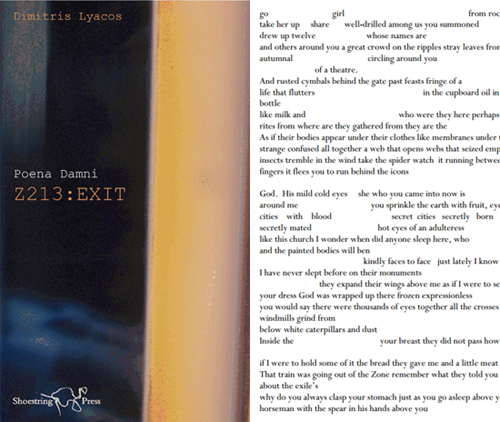

Homer, Aeschylus and Dante as well as the darker aspects of romantic poetry together with symbolism, expressionism, and an intense religious and philosophical interest permeate the work. The trilogy would appear to belong to a context of tragic poetry and epic drama, albeit distinctly postmodern at the same time. The Myia dance company has been performing a contemporary dance version of Nyctivoe in Greece since spring 2006. In 2004 a sound and sculpture installation by sculptor Fritz Unegg and director Piers Burton-Page as well as a video stemming from Nyctivoe, by Gudrun Bielz were produced. Austrian artist Sylvie Proidl, presented a series of paintings in 2002 in Vienna. Various artists have brought Lyacos' work in different artistic media. The second part was published in 2001 in Greek and German it came out in English in 2005. The third part appeared first (O protos thanatos) in Greek and was later translated in English, Spanish and Italian. The trilogy has been written back to front.

In 1992 Lyacos set about writing a trilogy under the collective name "Poena Damni", referring to the hardest trial the condemned souls in Hell have to endure, i.e. From 1988-1991 he lived in Venice, then moved to London, studied philosophy at University College London and stayed there for thirteen years. He was born and raised in Athens where he studied Law. Never has so small a book seemed so infinite.Dimitris Lyacos (Δημήτρης Λυάκος) (born on October 19, 1966) is a contemporary Greek poet and playwright. That shockingly vivid imagery is there also, but there is so much more to Z213: EXIT. The style of the language in the prose sections is most reminiscent of a fragmented version of McCarthy's hyper-lucid, hallucinogenic prose in Blood Meridian. Dimitris Lyacos uses a fusion of stream-of-consciousness, verse, and prose to construct this fascinating narrative that approximates a journey made in consecutive nightmares while addressing the big issues that have defined the human experience.

ASYMPTOTEĪ fierce book that is as much puzzle as narrative, Z213: Exit is the first in a trilogy (known as the Poena Damni) that represents more than three decades of work. How did a book of Greek poetry become one of the most-discussed and most-lauded pieces of contemporary European literature? Garrett Phelps, Assistant Managing Editor at Asymptote, explains what makes Dimitris Lyacos' Poena Damni trilogy is so unusual-and so difficult to describe.


 0 kommentar(er)
0 kommentar(er)
